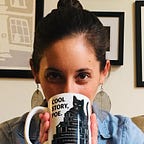The Body vs The Person
Once we reach a certain age, we usually work hard to hide the indelicacies of our bodies. We spray air freshener after using the bathroom, avoid farting in front of a significant other during the first few months of dating, apply deodorant and perfume to hide body odors, and avoid sharing gross details of ailments. We worry that if these unseemly things are revealed to others, it will impact their opinions of us, and thus we generally only reveal them to such trusted people as doctors and spouses. However, when a family member is seriously ill, all of these norms can fly right out the window.
Three years ago, my grandfather was in the hospital being treated for an array of issues, and he was sedated for much of the time. My grandmother, though devotedly by his side, was in a fragile state, and so my family and I tried to be by her side as often as possible — not only to be there to see my grandfather and to offer my grandmother emotional support, but also to make sure that there was someone around who could absorb and record the important information from the medical team. Each day someone sent out an email with updates, and the chain eventually included nine people (not including my grandmother). The emails included details about organ function, neurological status, intubation, sodium imbalances, and more. I’m barely comfortable talking to my doctor about my own waste production, and suddenly I was learning details about my grandfather’s.
When I took a step back, it felt like an awkward invasion of privacy to know all these gritty, intimate details about the state of his body. It is usually the spouse’s job to be privy to this information, but during this time of crisis, it had become family-wide knowledge as we took turns visiting the hospital and speaking with the doctors and nurses. My grandmother was uncomfortable with everyone knowing everything and talking about it. However, we felt it was important because we needed to help her keep track of important information while her mind was all over the place. This was of course an emotional time for all of us, but even more so for her, especially since she was at the hospital with him every single, exhausting day. (She was also, unbeknownst to us at the time, slowly beginning her battle with Lewy body dementia, which could not have helped matters.) We wanted to be prepared to help her make informed decisions. My father reminded her of this, as well as the fact that we truly only had my grandfather’s best interests in mind. No one was getting these emails because we possessed a morbid curiosity, but rather because we cared about him and wanted to do what we could to support recovery.
I also found the practice of taking a break from the medical talk and speaking directly to my grandfather important, despite the fact that he did not appear to be conscious. The doctors said that someone in his state may very well be able to hear what people say. Talking to him also helped remind all of us that this was a very real, wonderful person, and that he was more than just his body. His body may have been what betrayed him, as he ultimately succumbed to his illness, but we were not praying for his recovery simply so we could have him physically with us again.
Even though my grandfather is gone now, our memories are not defined by the illness that took him from us, despite spending a month being constantly inundated with medical terminology and numbers. Instead of organ function, we think of his hugs. Instead of intubation, we think of his inability to skip and how it made his grandkids giggle. Instead of sodium imbalances, we think of his boundless patience and kindness. His body was a vehicle for all the things we truly loved, and that love lives on long after the body is gone.
